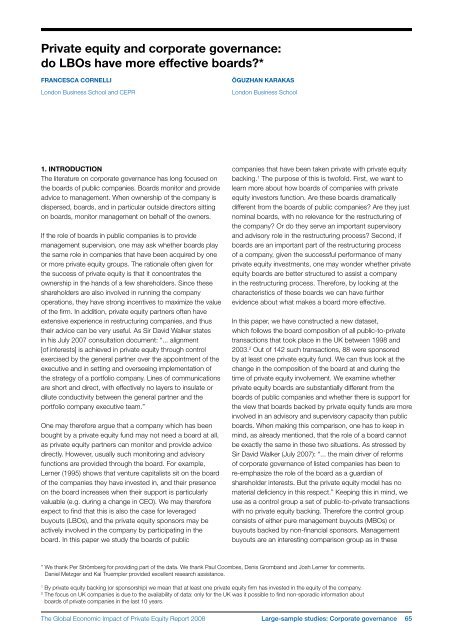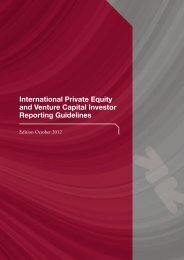ReferencesAmess, K. and M. Wright (2007), “<strong>The</strong> Wage andEmployment Effects <strong>of</strong> Leveraged Buyouts in the UK”,International Journal <strong>of</strong> the <strong>Economic</strong>s <strong>of</strong> Business 14,179–195.British Venture Capital Association (BVCA) (2006), <strong>The</strong><strong>Economic</strong> <strong>Impact</strong> <strong>of</strong> <strong>Private</strong> <strong>Equity</strong> in the UK, London, BVCA.Davis, S.J. and J.C. Haltiwanger (1999), “Gross Job Flows”,in David Card and Orley Ashenfelter (eds.), Handbook <strong>of</strong>Labor <strong>Economic</strong>s, New York, North-Holland.Davis, S.J., J.C. Haltiwanger, R. Jarmin et al (2006),“Measuring the Dynamics <strong>of</strong> Young and Small Businesses:Integrating the Employer and Non-employer BusinessUniverses”, Working paper no. 13266, National Bureau <strong>of</strong><strong>Economic</strong> Research. Forthcoming in Dunne, T., J. BradfordJensen and M.J. Roberts (eds.), Producer Dynamics: NewEvidence from Micro Data, University <strong>of</strong> Chicago Press.Davis, S.J., J.C. Haltiwanger, R. Jarmin et al (2007), “VolatilityDispersion in Business Growth Rates: Publicly Traded versus<strong>Private</strong>ly Held Firms”, in Acemoglu, D., K. Rog<strong>of</strong>f and M.Woodford (eds.), NBER Macroeconomics Annual 21, 107–180.Davis, S.J., J.C. Haltiwanger and S. Schuh (1996), JobCreation and Destruction, Cambridge, MA, MIT Press.European <strong>Private</strong> <strong>Equity</strong> and Venture Capital Association(EVCA) (2005), Employment Contribution <strong>of</strong> <strong>Private</strong> <strong>Equity</strong>and Venture Capital in Europe, Zaventum, Belgium, EVCA.Hall, D. (2007), “Methodological Issues in Estimating the<strong>Impact</strong> <strong>of</strong> <strong>Private</strong> <strong>Equity</strong> Buyouts on Employment”,unpublished Working Paper, Public Services InternationalResearch Unit, Business School, University <strong>of</strong> Greenwich.Harris, R., D.S. Siegel and M. Wright (2005), “Assessing the<strong>Impact</strong> <strong>of</strong> Management Buyouts on <strong>Economic</strong> Efficiency:Plant-Level Evidence from the United Kingdom”, Review <strong>of</strong><strong>Economic</strong>s and Statistics 87, 148–153.Jensen, M.C. (1989), “<strong>The</strong> Eclipse <strong>of</strong> the Public Corporation”,Harvard Business Review 67 (September–October), 61–74.Kaplan, S.N. (1989), “<strong>The</strong> Effects <strong>of</strong> Management Buyoutson Operating Performance and Value”, Journal <strong>of</strong> Financial<strong>Economic</strong>s 24, 217–254.Kearney, A.T. (2007), Creating New Jobs and Value with<strong>Private</strong> <strong>Equity</strong>, Chicago, A.T. Kearney.Lichtenberg, F.R. and D. Siegel (1987), “Productivity andChanges in Ownership <strong>of</strong> Manufacturing Plants”, BrookingsPapers on <strong>Economic</strong> Activity: Microeconomics, 643–683.Lichtenberg, F.R. and D. Siegel (1990), “<strong>The</strong> Effects <strong>of</strong>Leveraged Buyouts on Productivity and Related Aspects<strong>of</strong> Firm Behavior”, Journal <strong>of</strong> Financial <strong>Economic</strong>s 27,165–194.Long, W. and D. Ravenscraft (1993), “<strong>The</strong> FinancialPerformance <strong>of</strong> Whole Company LBOs”, CES workingpaper no. CES-WP-93-16, November 1993.McGuckin, R.H. and S.V. Nguyen (2001), “<strong>The</strong> <strong>Impact</strong><strong>of</strong> Ownership Changes: A View from Labor Markets”,International Journal <strong>of</strong> Industrial Organization 19, 739-762.Muscarella, C.J. and M.R. Vetsuypens (1990), “Efficiencyand Organizational Structure: A Study <strong>of</strong> Reverse LBOs”,Journal <strong>of</strong> Finance 45, 1389–1413.Schoar, A. (2002), “Effects <strong>of</strong> Corporate Diversificationon Productivity”, Journal <strong>of</strong> Finance 57, 2379-2403.Service Employees International Union (SEIU) (2007),Behind the Buyouts: Inside the <strong>World</strong> <strong>of</strong> <strong>Private</strong> <strong>Equity</strong>,Washington, SEIU.Shleifer, A. and L. Summers (1988), “Breach <strong>of</strong> Trust inHostile Takeovers”, in Auerbach, A.J. (ed.) (1988) CorporateTakeovers: Causes and Consequences, Chicago, University<strong>of</strong> Chicago Press.Strömberg, P. (<strong>2008</strong>), “<strong>The</strong> New Demography <strong>of</strong> <strong>Private</strong><strong>Equity</strong>”, in Anuradha G. and J. Lerner (eds,), <strong>Global</strong>ization <strong>of</strong>Alternative Investments Working Papers Volume 1: <strong>Global</strong><strong>Economic</strong> <strong>Impact</strong> <strong>of</strong> <strong>Private</strong> <strong>Equity</strong> <strong>2008</strong>, New York, <strong>World</strong><strong>Economic</strong> Forum USA.Taylor, A. and C. Bryant (2007), “<strong>Private</strong> <strong>Equity</strong> Deals thatCement Business Growth”, Financial Times, 2 April.Tornqvist, L., P. Vartia and Y. Vartia (1985), “How ShouldRelative Change Be Measured?”, American Statistician 39(February), 43–46.Wright, M., S. Thompson and K. Robbie (1992),“Management-Led Leveraged Buy-Outs: A EuropeanPerspective”, Journal <strong>of</strong> Business Venturing 7, 45–71.64 Large-sample studies: Employment<strong>The</strong> <strong>Global</strong> <strong>Economic</strong> <strong>Impact</strong> <strong>of</strong> <strong>Private</strong> <strong>Equity</strong> <strong>Report</strong> <strong>2008</strong>
<strong>Private</strong> equity and corporate governance:do LBOs have more effective boards?*FRANCESCA CORNELLILondon Business School and CEPRÕGUZHAN KARAKASLondon Business School1. Introduction<strong>The</strong> literature on corporate governance has long focused onthe boards <strong>of</strong> public companies. Boards monitor and provideadvice to management. When ownership <strong>of</strong> the company isdispersed, boards, and in particular outside directors sittingon boards, monitor management on behalf <strong>of</strong> the owners.If the role <strong>of</strong> boards in public companies is to providemanagement supervision, one may ask whether boards playthe same role in companies that have been acquired by oneor more private equity groups. <strong>The</strong> rationale <strong>of</strong>ten given forthe success <strong>of</strong> private equity is that it concentrates theownership in the hands <strong>of</strong> a few shareholders. Since theseshareholders are also involved in running the companyoperations, they have strong incentives to maximize the value<strong>of</strong> the firm. In addition, private equity partners <strong>of</strong>ten haveextensive experience in restructuring companies, and thustheir advice can be very useful. As Sir David Walker statesin his July 2007 consultation document: “... alignment[<strong>of</strong> interests] is achieved in private equity through controlexercised by the general partner over the appointment <strong>of</strong> theexecutive and in setting and overseeing implementation <strong>of</strong>the strategy <strong>of</strong> a portfolio company. Lines <strong>of</strong> communicationsare short and direct, with effectively no layers to insulate ordilute conductivity between the general partner and theportfolio company executive team.”One may therefore argue that a company which has beenbought by a private equity fund may not need a board at all,as private equity partners can monitor and provide advicedirectly. However, usually such monitoring and advisoryfunctions are provided through the board. For example,Lerner (1995) shows that venture capitalists sit on the board<strong>of</strong> the companies they have invested in, and their presenceon the board increases when their support is particularlyvaluable (e.g. during a change in CEO). We may thereforeexpect to find that this is also the case for leveragedbuyouts (LBOs), and the private equity sponsors may beactively involved in the company by participating in theboard. In this paper we study the boards <strong>of</strong> publiccompanies that have been taken private with private equitybacking. 1 <strong>The</strong> purpose <strong>of</strong> this is tw<strong>of</strong>old. First, we want tolearn more about how boards <strong>of</strong> companies with privateequity investors function. Are these boards dramaticallydifferent from the boards <strong>of</strong> public companies? Are they justnominal boards, with no relevance for the restructuring <strong>of</strong>the company? Or do they serve an important supervisoryand advisory role in the restructuring process? Second, ifboards are an important part <strong>of</strong> the restructuring process<strong>of</strong> a company, given the successful performance <strong>of</strong> manyprivate equity investments, one may wonder whether privateequity boards are better structured to assist a companyin the restructuring process. <strong>The</strong>refore, by looking at thecharacteristics <strong>of</strong> these boards we can have furtherevidence about what makes a board more effective.In this paper, we have constructed a new dataset,which follows the board composition <strong>of</strong> all public‐to‐privatetransactions that took place in the UK between 1998 and2003. 2 Out <strong>of</strong> 142 such transactions, 88 were sponsoredby at least one private equity fund. We can thus look at thechange in the composition <strong>of</strong> the board at and during thetime <strong>of</strong> private equity involvement. We examine whetherprivate equity boards are substantially different from theboards <strong>of</strong> public companies and whether there is support forthe view that boards backed by private equity funds are moreinvolved in an advisory and supervisory capacity than publicboards. When making this comparison, one has to keep inmind, as already mentioned, that the role <strong>of</strong> a board cannotbe exactly the same in these two situations. As stressed bySir David Walker (July 2007): “... the main driver <strong>of</strong> reforms<strong>of</strong> corporate governance <strong>of</strong> listed companies has been tore‐emphasize the role <strong>of</strong> the board as a guardian <strong>of</strong>shareholder interests. But the private equity model has nomaterial deficiency in this respect.” Keeping this in mind, weuse as a control group a set <strong>of</strong> public‐to‐private transactionswith no private equity backing. <strong>The</strong>refore the control groupconsists <strong>of</strong> either pure management buyouts (MBOs) orbuyouts backed by non‐financial sponsors. Managementbuyouts are an interesting comparison group as in these* We thank Per Strömberg for providing part <strong>of</strong> the data. We thank Paul Coombes, Denis Gromband and Josh Lerner for comments.Daniel Metzger and Kai Truempler provided excellent research assistance.1By private equity backing (or sponsorship) we mean that at least one private equity firm has invested in the equity <strong>of</strong> the company.2<strong>The</strong> focus on UK companies is due to the availability <strong>of</strong> data: only for the UK was it possible to find non‐sporadic information aboutboards <strong>of</strong> private companies in the last 10 years.<strong>The</strong> <strong>Global</strong> <strong>Economic</strong> <strong>Impact</strong> <strong>of</strong> <strong>Private</strong> <strong>Equity</strong> <strong>Report</strong> <strong>2008</strong> Large-sample studies: Corporate governance 65
- Page 2 and 3:
The Globalization of Alternative In
- Page 5:
ContributorsCo-editorsAnuradha Guru
- Page 9 and 10:
PrefaceKevin SteinbergChief Operati
- Page 11 and 12:
Letter on behalf of the Advisory Bo
- Page 13 and 14:
Executive summaryJosh lernerHarvard
- Page 15 and 16:
• Private equity-backed companies
- Page 17 and 18:
C. Indian casesThe two India cases,
- Page 19 and 20:
Part 1Large-sample studiesThe Globa
- Page 21 and 22:
The new demography of private equit
- Page 23 and 24:
among US publicly traded firms, it
- Page 25 and 26:
should be fairly complete. While th
- Page 27 and 28:
according to Moody’s (Hamilton et
- Page 29 and 30:
draining public markets of firms. I
- Page 31 and 32: FIguresFigure 1A: LBO transactions
- Page 33 and 34: TablesTable 1: Capital IQ 1980s cov
- Page 35 and 36: Table 2: Magnitude and growth of LB
- Page 37 and 38: Table 4: Exits of individual LBO tr
- Page 39 and 40: Table 6: Determinants of exit succe
- Page 41 and 42: Table 7: Ultimate staying power of
- Page 43 and 44: Appendix 1: Imputed enterprise valu
- Page 45 and 46: Private equity and long-run investm
- Page 47 and 48: alternative names associated with t
- Page 49 and 50: 4. Finally, we explore whether firm
- Page 51 and 52: When we estimate these regressions,
- Page 53 and 54: cutting back on the number of filin
- Page 55 and 56: Table 1: Summary statisticsPanel D:
- Page 57 and 58: Table 4: Relative citation intensit
- Page 59 and 60: figuresFigure 1: Number of private
- Page 61 and 62: Private equity and employment*steve
- Page 63 and 64: Especially when taken together, our
- Page 65 and 66: centred on the transaction year ide
- Page 67 and 68: and Vartia 1985.) Aggregate employm
- Page 69 and 70: sectors. In Retail Trade, the cumul
- Page 71 and 72: employment-weighted acquisition rat
- Page 73 and 74: FIguresFigure 1: Matches of private
- Page 75 and 76: Figure 6:Figure 6A: Comparison of n
- Page 77 and 78: Figure 8:Figure 8A: Comparison of j
- Page 79 and 80: Figure 11: Variation in impact in e
- Page 81: Figure 12: Differences in impact on
- Page 85 and 86: et al (2007) track the evolution of
- Page 87 and 88: groups aim to improve firm performa
- Page 89 and 90: distribution of the LBO sponsors, m
- Page 91 and 92: the most difficult cases. This stor
- Page 93 and 94: to see whether these changes of CEO
- Page 95 and 96: Figure 3:This figure represents the
- Page 97 and 98: TablesTable 1: Company size descrip
- Page 99 and 100: Table 5: Changes in the board size,
- Page 101 and 102: Table 7: Board turnoverPanel A: Siz
- Page 103 and 104: Part 2Case studiesThe Global Econom
- Page 105 and 106: European private equity cases: intr
- Page 107 and 108: Exhibit 1: Private equity fund size
- Page 109 and 110: Messer Griesheimann-kristin achleit
- Page 111 and 112: ealized it was not possible to grow
- Page 113 and 114: The deal with Allianz Capital partn
- Page 115 and 116: the deal, the private equity invest
- Page 117 and 118: Exhibit 1: The Messer Griesheim dea
- Page 119 and 120: Exhibit 5: Post buyout structureMes
- Page 121 and 122: New Lookann-kristin achleitnerTechn
- Page 123 and 124: feet. This restricted store space w
- Page 125 and 126: institutional investors why this in
- Page 127 and 128: Although a public listing did not a
- Page 129 and 130: Exhibit 5: Employment development a
- Page 131 and 132: Chinese private equity cases: intro
- Page 133 and 134:
Hony Capital and China Glass Holdin
- Page 135 and 136:
Hony’s Chinese name means ambitio
- Page 137 and 138:
Establishing early agreement on pos
- Page 139 and 140:
Executing the IPOEach of the initia
- Page 141 and 142:
Exhibit 1A: Summary of Hony Capital
- Page 143 and 144:
Exhibit 4: Members of the China Gla
- Page 145 and 146:
Exhibit 6A: China Glass post‐acqu
- Page 147 and 148:
Exhibit 8: China Glass stock price
- Page 149 and 150:
3i Group plc and Little Sheep*Lily
- Page 151 and 152:
y an aggressive franchise strategy,
- Page 153 and 154:
soul” of the business. But there
- Page 155 and 156:
Exhibit 1: Summary information on 3
- Page 157 and 158:
Exhibit 6: An excerpt from the 180-
- Page 159 and 160:
Indian private equity cases: introd
- Page 161 and 162:
ICICI Venture and Subhiksha *Lily F
- Page 163 and 164:
investment,” recalled Deshpande.
- Page 165 and 166:
2005 - 2007: Moderator, protector a
- Page 167 and 168:
Exhibit 3: Subhiksha’s board comp
- Page 169 and 170:
Warburg Pincus and Bharti Tele‐Ve
- Page 171 and 172:
founded two companies at this time
- Page 173 and 174:
By 2003 this restructuring task was
- Page 175 and 176:
Exhibit 1C: Private equity investme
- Page 177 and 178:
Exhibit 4B: Bharti cellular footpri
- Page 179 and 180:
Exhibit 6: Summary of Bharti’s fi
- Page 181 and 182:
Exhibit 7: Bharti’s board structu
- Page 183 and 184:
In the 1993‐94 academic year, he
- Page 185 and 186:
consumer products. She was also a R
- Page 187 and 188:
AcknowledgementsJosh LernerHarvard
- Page 189:
The World Economic Forum is an inde















